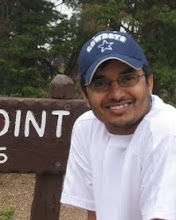My principles of teaching...
A slowly growing list of insights or concepts.
(1) Any thing that is slightly related to what you already know is very easy to understand and explain.
(2) Any thing that is confusing and possibly misunderstood should be repeated many times.
(3) If the same concept is explained in more than one way, it can lead to better insights and understanding.
(4) Attention span is continuously varying and requires constant readjustment and re-fixation
(5) High-level of interest leads to increased participation.
(6) A discussion or Q & A based interaction has much more capability of passing the knowledge than a one-way communication
(7) Explaining the concept from the fundamentals all the way to the details will help in reestablishing the relevance of a specific topic. Without that the first question we tend to think is: What is the point ?
(8) Practice and challenging problems helps in nailing the concept details in mind
(9) If advanced concepts can be tied with day-to-day incidents or events, then the concept can be made lighter
(10) A small project explains the concept 1000 times better than reading that information. Once the basic level is established more advanced stuff can be read or discussed. A good balance of theory and practice will go far beyond what they can achieve individually
(11)
Impact of Kolmogorov
He is considered as one of the leading mathematician of 20th century for his contribution in probability, real-analysis and other topics. I would like to devote some of my time to read his books on real-analysis and probability.
I also enjoyed of brief snippet given about Kolmogorov (taken from
here)
"To this school he devoted a major proportion of his time over many years, planning syllabuses, writing textbooks, spending a large number of teaching hours with the children themselves, introducing them to literature and music, joining in their recreations and taking them on hikes, excursions, and expeditions. ... [Kolmogorov] sought to ensure for these children a broad and natural development of the personality, and it did not worry him if the children in his school did not become mathematicians. Whatever profession they ultimately followed, he would be content if their outlook remained broad and their curiosity unstifled. Indeed it must have been wonderful to belong to this extended family of [Kolmogorov]"
Labels: mathematicians
Impact of hightech on society
http://www.longnow.org/
http://spectrum.ieee.org/jun08/6272
http://www.wired.com/wired/archive/8.04/joy_pr.html
http://antpac.lib.uci.edu/search/X?SEARCH=The+Agony+and+the+Ecstasy&SORT=D&searchscope=7
http://www.foresight.org/
Must listen audio books
1) Adventure of Huck Finn
http://librivox.org/the-adventures-of-huckleberry-finn-by-mark-twain-version-3/
2)
Upcoming works to be listened:
1) http://712educators.about.com/cs/novelsmenu/tp/amlitnovels.htm
2)
http://ask.metafilter.com/79067/Librivox-Recommendations
Best Science based Interview I have read
(1)
Lawrence Stark - Mind's eye and Superb interdisciplanarianhttp://globetrotter.berkeley.edu/conversations/Stark/stark-con0.html
(2) Charles Townes - Laser Inventor
http://globetrotter.berkeley.edu/people/Townes/townes-con0.html(3)
Famous science themes in USA
(1) Mount Wilson - Largest observatory in USA - California
(2) American Museum of Natural History - Hayden Planitorium - New York
(3)
Museum of Science - Boston
(4) Computer History Museum - Mountain View California
(5) Discovery Science Centre - Anaheim
(6) Science Exploratorium - San Fransisco
